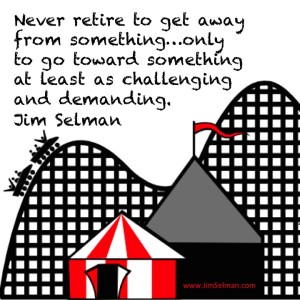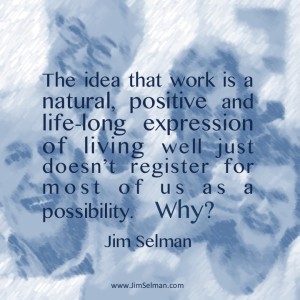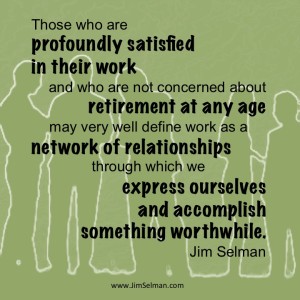 By Jim Selman | Bio
By Jim Selman | Bio
Stephanie Chen, a writer for CNN, recently published “No Retirement for These Older Folks, Just Work” about older workers and the fact that more and more people have to keep working well beyond their ‘retirement age’. For some, this is purely a function of economic necessity. For others, it is a choice. The piece included two examples, a 91-year-old postal worker and a 101-year-old legislative employee who are still going strong. If we’re to believe the predictions from Washington DC, everyone is going to be working longer as a function of keeping Social Security solvent.
The examples in Stephanie Chen’s article are exceptions that prove the rule that states very few folks would keep working if they really had a choice. This unspoken, unwritten imperative has us looking for some strong justification or reasons why people choose to continue working in later life.
As I approach my 70th birthday, I think about the subject of retirement a lot. Most of my friends are betting that I’ll keep going until I drop. I love what I do … so why not? Nonetheless, there is a lot of social and cultural pressure to ‘stop work’ and do all the things I didn’t do presumably because I was ‘working’. One of the more compelling arguments for retirement is to step aside to make room for younger people and fresh ideas. Part of my dilemma (and I suspect that of a lot of people) is that the word ‘work’ itself occurs with some ‘negative’ connotations–even when we enjoy what we’re doing.
 The idea that work is a natural, positive and life-long expression of living well just doesn’t register for most of us as a possibility. Why?
The idea that work is a natural, positive and life-long expression of living well just doesn’t register for most of us as a possibility. Why?
I think one reason is that our Industrial Age notions equate work with performing tasks. The same structure of interpretation that created the assembly line still applies for virtually all jobs. Just read any job description. The employment ‘contract’ is based on payment in exchange for performance of recurring tasks that are, in turn, measured by various forms of objective ‘outputs’. The human being is viewed as a ‘function’ in a mechanical process–like a cog in a machine. Clearly exceptions exist, mostly in roles that are inherently creative and people-intensive (such as management, research, marketing and the arts). Yet there are strong efforts on the part of most corporations even in these areas to objectify, systemize and, at the end of the day, attempt to control this more subjective, less predictable work.
Who would want to be a cog in a machine any longer than necessary? Is it any wonder that so many people, particularly in large bureaucracies, count the hours until quitting time and the years until they can retire?
Fundamental to our contemporary view of work is an attempt to measure and objectify work and our relationship with all that goes with it. Ironically, there are many other ways to view work, regardless of one’s job.
As most retirees report, the most shocking aspect of their ‘post-working’ lives is the absence of relationships. Virtually all of our conversations during our working years are structured in the context of relationships with peers, customers, suppliers, managers and employees. When we stop working, we stop receiving requests from all these people. Unless we are involved in other networks in our communities, there is no external stimulus to generate commitments. Except for family and a few friends, we may very well be alone. It is easy to become isolated and to begin a very unpleasant downward spiral that can be considerably more stressful and depressing than anything we ever experienced at work.
 Those who are profoundly satisfied in their work and who are not concerned about retirement at any age may very well define work as a network of relationships through which we express ourselves and accomplish something worthwhile. From this perspective, we find that the distinctions between work and play blur. Work becomes a natural aspect of life. A ‘job’ is now more of a ‘deal’ where we make an offer and someone accepts and pays us for what we offer. Today, most employees only offer their willingness to perform pre-defined tasks.
Those who are profoundly satisfied in their work and who are not concerned about retirement at any age may very well define work as a network of relationships through which we express ourselves and accomplish something worthwhile. From this perspective, we find that the distinctions between work and play blur. Work becomes a natural aspect of life. A ‘job’ is now more of a ‘deal’ where we make an offer and someone accepts and pays us for what we offer. Today, most employees only offer their willingness to perform pre-defined tasks.
Finally, if we view work as something that we generate from within ourselves and express through various relationships, we might also see that the currently unemployment situation in the USA could be transformed if we could shift the responsibility for creating jobs from the government and employers to the employee. There are very few business people who will not accept a value-adding proposition when they can see a clear return on their investment. In effect, we’d become a nation of entrepreneurial-thinking people looking for opportunities to create and add value, rather than a ‘workforce’ of people trained at performing tasks and feeling powerless in the absence of a ‘slot’ in an organization.
One way or another, the ‘idea’ of work is transforming. In the process, it is revealing a shift from power and possibility as a function of central authority and organization to the individual becoming increasingly responsible and empowered. This is already apparent in how many of today’s young adults are coping with the current economic doldrums. They are living and working together in a variety of collaborative arrangements, innovating and creating more and more novel solutions to problems, and ‘playing’ at making a living–while at the same time holding on to their appreciation for the more qualitative (and not measurable) aspects of life.
I agree with Ms Chen that America’s 70 million Boomers are going to be working for a long, long time. Hopefully, most will be working as a matter of choice. For those of us who are thinking about retirement, I have two recommendations:
1. Never retire to get away from something…only to go toward something at least as challenging and demanding.
2. Don’t ask what you want to ‘do’, but ask what you want to accomplish and then who you want to play with to accomplish it.
At the end of the day, work and play are false distinctions. We won’t have a balance sheet when we die. Regardless of when and if we retire, what matters will be whether we have lived full out–whether we were working or playing–until the end.
© 2010 Jim Selman. All rights reserved.
